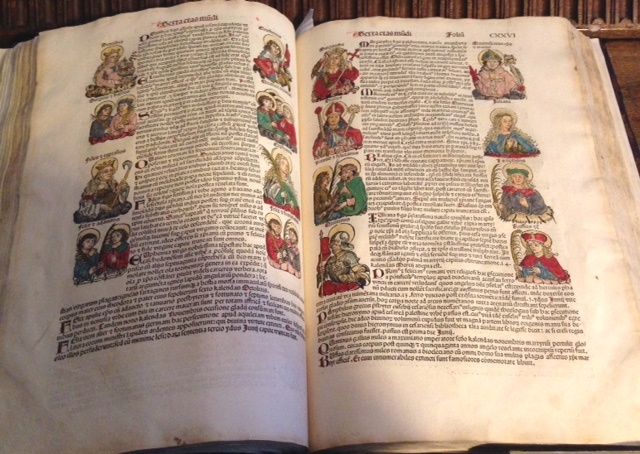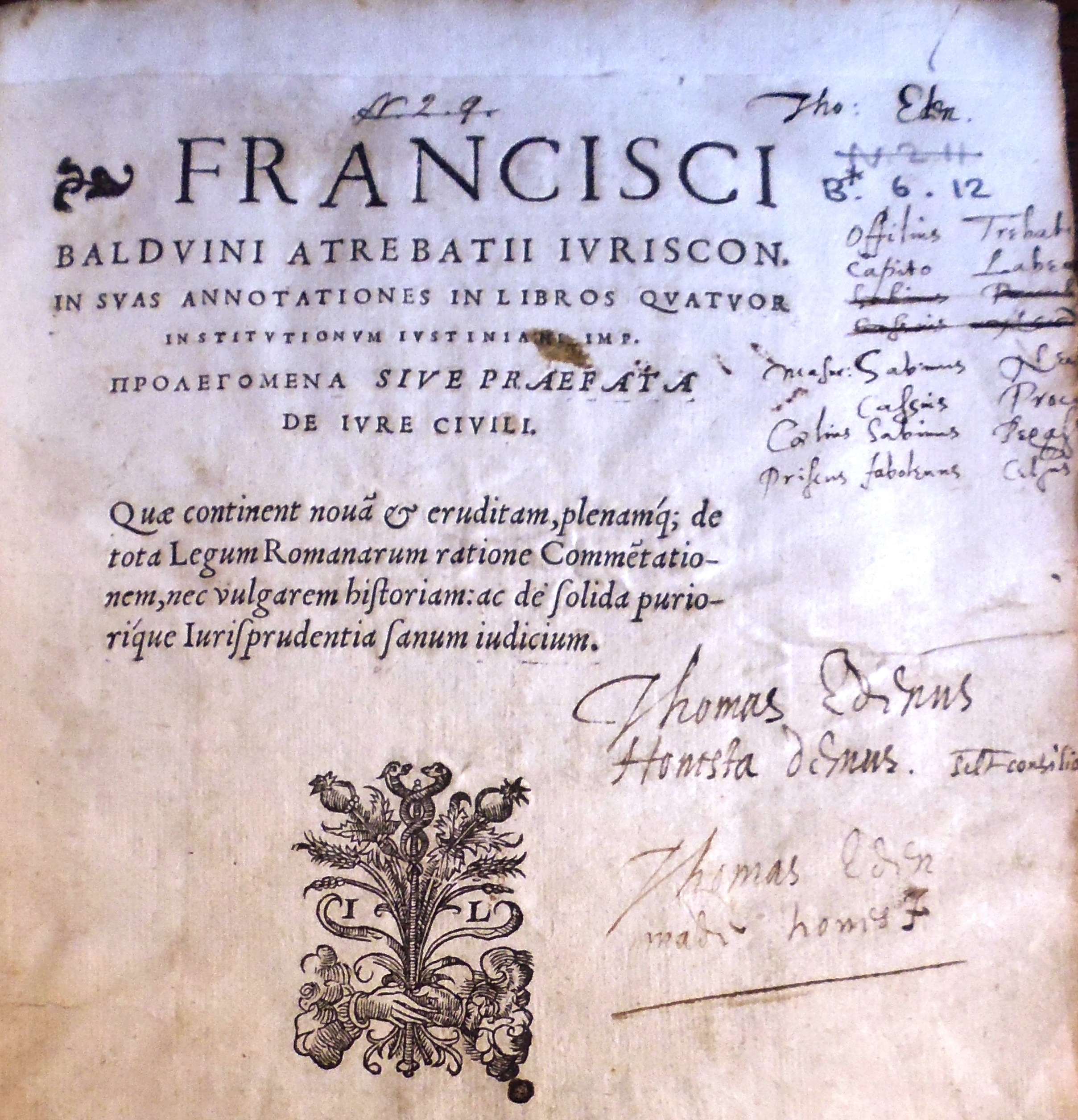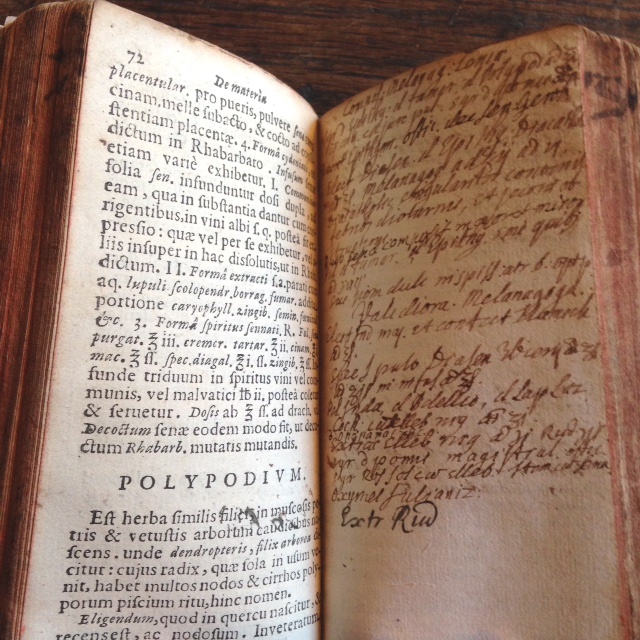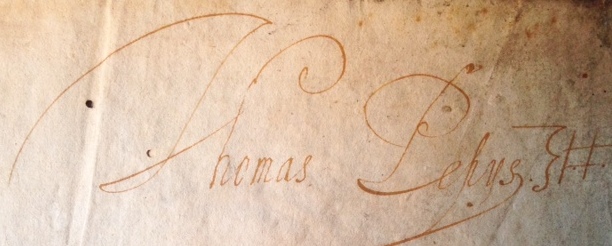Posted:
14 Dec 2017
Similar to other college libraries in Cambridge and Oxford, the Old Library at Trinity Hall was founded and grew throughout centuries thanks to the continuous generosity of the College’s Masters and Fellows, alumni and sometimes private benefactors.
The Library was founded in the 14th century by Bishop William Bateman who donated a number of books to be housed and chained in a “safe room” so that “all the scholars of the College may have common access to them” (De libris collegii, II, 432). During the next two hundred years, the holdings grew steadily through donations and bequests, and by the end of the 16th century, the College built a new library to accommodate the expanding collections. It is possible that the decision was prompted by the receipt of a large bequest of legal books from the former Master William Mowse who, in his will dated 1588, left approximately 225 legal works to Trinity Hall.
William Mowse was a civil lawyer and a scholar educated at Trinity Hall (LLB, 1538; LLD, 1552) who became Master of the College in October 1522. Upon Queen Mary’s accession to the throne, Mowse was removed from his position, only to be reinstated in November 1555, for a second term that lasted for about four years. After resigning from the Trinity Hall mastership, Mowse was appointed vicar-general to the Archbishop of Canterbury and judge of the court of audience. Despite leaving the College, he maintained a strong connection to Trinity Hall and left his substantial collection of legal works (mostly 16th-century titles from continental presses) to the College Library.
A second major donation came from outside Trinity Hall. Robert Hare was a politician and an antiquary from London who began collecting rare books and manuscripts after his retirement from public life as an MP in 1571. Although a former student of Gonville Hall and of the Inner Courts in London, Hare had family connections to Trinity Hall and shared a long-term friendship with the Master William Mowse. Hare gave the Library approximately 50 early printed books (among them, some rare incunabula) and 11 manuscripts, which are still esteemed today as some of the Library’s most treasured possessions.

Hand-coloured copy of the “Liber chronicarum” (also known as “The Nuremberg Chronicle”) donated to TH by Robert Hare
The 17th and 18th centuries saw an increase in the number of contributions to the Library, either directly in the form of books or indirectly, through the provision of funds for their purchase. One large donation was that of Dr. Thomas Eden, civil lawyer, academic, politician and Master of Trinity Hall between 1626 and 1645. Eden gave approximately 110 legal works to the Library, including a manuscript of his own work, Commentarius in titulum De Regulis Iuris, containing his lecture notes in Latin.

Inscriptions of Thomas Eden, Master of Trinity Hall (1626-1645)
Throughout the years, the library holdings were augmented through occasional gifts of one, two or three volumes from various Masters, Fellows and students of the College. Some of these early benefactors included: Edmund Mundford (1546–1644), Fellow of Trinity Hall, James Hobart (1524-1615), Esq. of Hales-Hall, Norfolk, Sir John Hobart (1567-1613), a Trinity Hall graduate and member of the first Jacobean Parliament and Thomas Hughes (1640-1738), Fellow of the College between 1672 and 1678.
Also on the donors’ list were some well-known names such as: John Cowell (1552-1611), Master of Trinity Hall and Regius Professor of Civil Law and Thomas Pepys (1621-1665), physician, Fellow of Trinity Hall and cousin of the famous diarist Samuel Pepys. Thomas Pepys gave four books on medicine to the Library, one of which (a volume of medical prescriptions) carries his extensive manuscript notes and annotations, written on the margins of the pages or on the extra blank leaves inserted throughout the volume.

Thomas Pepys’ working copy of “Formulae remediorum” with blank leaves inserted for his annotations

Thomas Pepy’s signature
Although the exact provenance of all the books in the Old Library is not always known, some former owners can be identified based on the autographs, inscriptions, stamps or bookplates they left in their tomes. A good example of a volume with a fascinating ownership history is the work of customary law entitled Commentaires du droict civil tant public que privé, observé au pays & duché de Normandie, printed in Paris in 1574 by Jacques du Puys. The autographs and annotations in the book suggest that it was successively owned by several generations of jurats on the island of Guernsey and used extensively as a reference tool for their legal work. The volume was eventually donated to Trinity Hall in 1937, by Victor Michael Graham de Vic Carey (1900-1964), a former student of the College (B.A. 1922) and an advocate of the Guernsey Royal Court.
Previous ownership can sometimes be established through an examination of the book bindings. For example, a 16th century volume from the Old Library containing Justinian’s Constitutions, printed in Greek in 1542 is bound in dark calf with the initials “E C” stamped in the centre of the covers. According to the book historian David Pearson (Pearson, p. 119), the initials “E C” can be associated with the English barrister and judge Edward Coke (1552-1634) who is widely considered the greatest jurist of the Elizabethan and Jacobean eras.
Another book from the Old Library collections with a famous previous owner is Apian’s History of Rome printed in Paris in 1551, and bound in calf with the arms of Cardinal Jules Mazarin gold-stamped on the covers. Well-known as the statesman and politician who served as the Chief Minister to the Kings Louis XIII and Louis XIV of France, Mazarin was also a noted collector of art, jewels and books. His personal library of more than 40,000 volumes was in the mid 17th-century the largest collection in Europe and, although it was looted and almost entirely destroyed during an outbreak of La Fronde, it survived and eventually served as the foundation of the Mazarin Library extant in Paris today.
The cataloguing project of the Old Library’s collections has made the names of all the donors, benefactors and former owners of books at Trinity Hall available on-line, alongside other important bibliographic information describing the volumes currently housed in the Library. The names of the benefactors are here to remind us of the importance of philanthropic support and generous donations to the Library and the College at large.
References:
Hinton, Lavinia. Trinity Hall. The story of the Library. University Press, Cambridge, 2000.
Oxford Dictionary of National Biography. Accessed Nov. 20, 2017.
Pearson, David. Provenance research in book history. London, British Library, 1994.
Commiss. Docts. (Cambridge). De libris Collegii, II. 432.
